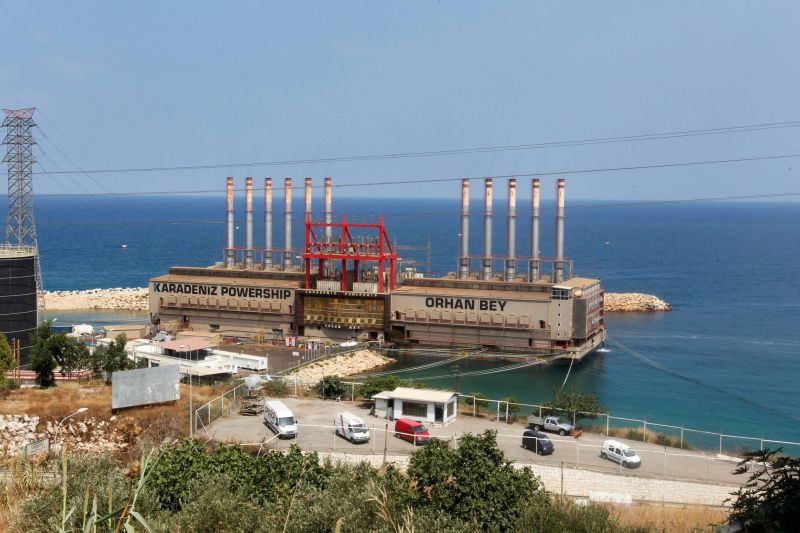
An electricity-generating ship from Turkey is seen docked at the port of Jiyyeh, south of Beirut. (Credit: Aziz Taher/Reuters)
Want to get the Morning Brief by email? Click here to sign up.
The Turkish company Karpowership announced that two offshore power barges would recommence supplying electricity to Lebanon yesterday in what it called a decision “made out of goodwill.” The Istanbul-based firm had cut off the supply in mid-May following a dispute over payment arrears and a judicial order that the ships be seized based on allegations of corruption in the renewal of power-supply contracts. The decision had reduced the capacity of Lebanon’s electricity network by about 240 megawatts, Électricité du Liban said in May. It was unclear yesterday evening whether the issues had been resolved. State power supply cuts, in some cases lasting more than 20 hours per day, have caused supply and service disruptions at both public and private sector entities in recent weeks, with many warning of dire consequences if prolonged outages persist.
Lebanon’s Higher Defense Council called on military and security forces to “remain in a state of readiness” yesterday, as protesters continued to sporadically cut off roads across the country. In a statement issued after a meeting chaired by President Michel Aoun, the council asked the finance minister to coordinate with the defense and interior ministers to support security forces “in light of the deteriorating financial and economic conditions.” Aoun condemned the roadblocks of recent days, saying they “have caused great suffering for citizens.” Over the weekend and stretching into Monday and Tuesday, protesters blocked roads in areas from Saida to Beirut to Tripoli, disrupting traffic in protest against economic and living conditions that are worsening by the day. The council’s call came hours after the Energy Ministry significantly increased fuel prices based on the government’s decision to shift the fuel subsidy rate to LL3,900 to the dollar.
Lebanon’s Internal Security Forces seized 100,000 captagon pills bound for Saudi Arabia that had been hidden inside sterilization equipment. The ISF said in a statement that it had arrested three individuals who allegedly confessed to the attempted smuggling operation. The seizure comes days after Saudi security forces seized a much larger quantity of captagon — 14.4 million pills — at the Jeddah port, which reportedly had come from Latakia in Syria via Beirut. In April, the kingdom imposed a ban on all fruit and vegetable shipments from Lebanon after its customs officers found 5.3 million captagon pills hidden inside hollowed-out pomegranates. Lebanese Ambassador to Saudi Arabia Fawzi Kabbara warned earlier this month that the kingdom was preparing to ban all imports from Lebanon, saying the country’s measures to prevent drug smuggling have been inadequate.
Public Prosecutor Ghassan Oueidat summoned and then released the president of a local NGO yesterday, after a crowd linked to his organization had stormed a bank in Beirut on Monday. The Banin Charity Association’s president, Mohamed Beydoun, told L’Orient Today that the judge will now analyze CCTV footage from the Lebanese Swiss Bank’s Hamra headquarters to assess whether individuals involved with his NGO had assaulted bank employees. Meanwhile, banks across the country remained closed yesterday in what the Association of Banks in Lebanon said was a show of solidarity with the Lebanese Swiss Bank. Following Monday’s incident, which the bank said had resulted in injuries for three of its employees, the bank announced that it would remain shut until its workers’ safety could be guaranteed. The Federation of Syndicates of Bank Employees in Lebanon issued a statement yesterday condemning the incident.
Parliament is set to vote today on a proposed “urgent law” that, if approved, would establish a ration card system for Lebanon’s poorest families to replace subsidies on essential goods. The ration card system would be financed through a $556 million “exceptional credit” line that would fund direct money transfers provided through electronic cards. However, details of the proposed law’s rollout, including funding and which households would be eligible to receive a card, remain unclear. Apart from the ration card, a two-day plenary parliamentary session beginning today has a 73-item agenda. Noticeably absent from the list is a capital control draft law that would formalize restrictions on commercial bank depositors’ money transfers and withdrawals, which Lebanon’s banks have illegally imposed since late 2019.
Lebanon’s cash-strapped army will begin selling helicopter rides to civilians. According to the military’s website, anyone ages 3 and older will be able to pay $150 in cash per flight starting Thursday to experience “Lebanon … from above” aboard one of the army’s Robinson R44 Raven helicopters. The initiative aims “to encourage Lebanese tourism in a new way, in addition to supporting the air force,” a military source told AFP. As Lebanon’s economic crisis erodes the value of soldiers’ lira-denominated salaries, as well as the organization’s budget for maintenance and equipment, the army’s head, Gen. Joseph Aoun, has appealed to the international community for support. Earlier this month, France hosted a virtual donor conference to drum up emergency aid for Lebanon’s army, though no concrete aid was announced.
Correction: A previous version of the Morning Brief stated that the parliamentary session beginning today has a 72-item agenda. In fact, the agenda has 73 items.
